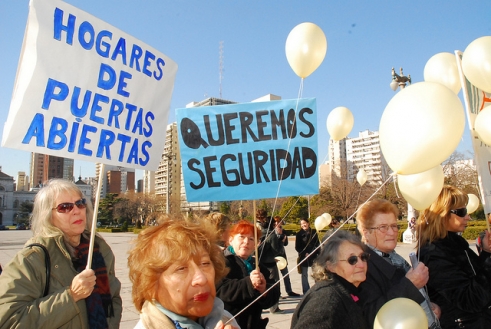 By Caroline Graham
By Caroline Graham
HelpAge International is attending the first-ever UN High-Level Meeting on non-communicable diseases (NCDs).
Up to 20 heads of state are expected to attend the event in New York on the 19-20 September.
The meeting will look at how to tackle four prominent non communicable diseases – cardiovascular diseases, cancers, chronic respiratory diseases and diabetes – and the common risk factors of tobacco use, alcohol abuse, unhealthy diet, physical inactivity and environmental carcinogens.
HelpAge’s Strategy Adviser Mark Gorman and HelpAge Global Ambassador Alex Kalache will attend the summit where they are working with ten other agencies including – AARP, Alzheimer’s Disease International, Caregivers Action Network and the NCD Alliance – to ensure the summit outcome is relevant to older people across the developing world where NCDs are increasing as populations age.
And even before the meeting has begun, our collective campaigning and hard work has already yielded some success.
Thanks to our and our partners’ work over the past few months, the UN meeting’s draft document – also called the political declaration – now contains specific references to population ageing, Alzheimer’s and other dementias, the importance of social protection and care, including palliative care, and universal primary healthcare.
Click here to read the ten agencies’ joint statement on getting ageing, dementias and caregiving into the Non Communicable Diseases high level meeting.
An early success for older people
We also campaigned for the summit’s draft document to have references to ‘premature death’ removed as this wording implies there is an age cut-off after which preventing death from NCDs becomes less important.
These words have been replaced by the term ‘preventable death’ across the whole course of someone’s life.
Mark Gorman said: “We welcome the current draft because it has these references which are important because a key driver of the rise of NCDs is population ageing. Older people everywhere, including in the developing world, must be fully included in the global response to NCDs.
“We welcome also the document’s strong emphasis on national plans being in place by 2013 and that NCDs are to be integrated into the development agenda. We will be working hard after the summit to ensure that older people will be fully included in those plans and programmes.
“Nevertheless despite the progress made we are disappointed that there are no clear targets in the document.
“It is important that the outcomes of the summit reach all age groups and take special note that two-thirds of those affected by NCDs are over 60, with a growing number in the developing world.”
For more from Mark Gorman read his blog from the UN NCD summit.
Older people are more at risk from NCDs
- People over 60 accounted for 75% of the 35 million deaths from NCDs worldwide in 2004, with the majority in the low and middle income world.
- Global ageing is recognised by the World Health Organisation as the first of four drivers of non communicable disease predominance in developing countries.
- Older people in low and middle income countries are at especially high risk of cardiovascular disease, stroke and diabetes, as well as Alzheimer’s and other dementias.
- Many older people in developing countries who suffer from hypertension (high blood pressure) also experience co-morbidities such as diabetes and heart disease but these often remain undetected.
- According to Alzheimer’s Disease International’s The World Alzheimer Report 2010, cases of dementia are expected to double to 65.7 million by 2030.
What you can do:
- We are asking all our supporters, Affiliates and partners to raise these issues with their government representatives at the summit.
- Do you think older people in your country face discrimination in getting treatment for cancer, diabetes, cardiovascular disease, hypertension and dementia? We’d love to hear from you – leave us a comment below or post on our Facebook page.
- Keep up to date on how our
campaign is going by signing up for our eNewsletter.
- Read this edition of Ageing and Development (1.1mb) which includes more stories on older people and non communicable diseases.
